

 |
 |
 |
 |
 |
 |
 |
 |
|||||||
|
||||||||
Keith
Emerson 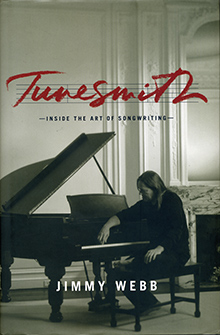 It's a part of the book - the one at the start of chapter eleven, titled Living With It - that has to be read in full. Here are two brief excerpts: "Songwriters are particularly vulnerable prey for many diseases of the spirit. Their finely tuned emotional nature is a delicate engine, a high-performance racing type but not particularly efficient and prone to breakdowns and costly repairs." Then, talking about depression: "The effort involved in holding this monster at bay creates other vulnerabilities: the temptation to self-medicate along with the addictions that may follow, as well as related professional failures that may destroy a person's faith in their own future." For decades, Keith Emerson was for keyboard magazines what Jimi Hendrix was for guitar magazines. One has only to take a look at the cover story (U.S. mag) Keyboard magazine ran at the time when Emerson appeared to be about to quit playing, due to illness. (It has to be noticed that at the time Emerson was way past his peak as a commercial recording artist.) 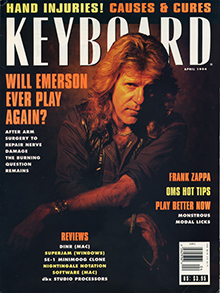 In a way, it was funny to be reminded of the importance of one's limbs at a time when sequencers, samplers, computers, and the like were the dominating forces in music. While - due to laziness, or maybe it was incompetence? - not many talked about how an average trio of guitar-bass-drums could make all those sounds in a live situations. (Hint: the answer was to be found under the stage!). One was also reminded of those quarrels - so similar to those about soccer teams - about who was the better player, Emerson or Wakeman. Emerson had really become a famous performer the moment the group's guitarist abandoning ship made The Nice a trio. Here one could trace a parallel with Jimi Hendrix, whose trio was not "a group of equals" like Cream. And while compositions by Bach, Sibelius, and Tchaikovsky were performed alongside covers of songs by Bob Dylan and Tim Hardin, Emerson's Hammond L100 being shaken and knifed provided the necessary show-biz visual accompaniment. 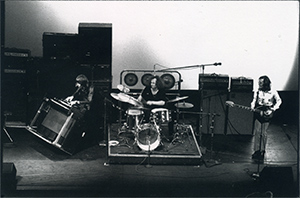 It was the era of "progressive groups" - in the original meaning of the time: "broadening the horizons" - a category where Family stood side-by-side with Patto and Curved Air. Let's mention those groups that gave a lot of space to keyboards as protagonists: Yes, Genesis, Pink Floyd, Gentle Giant, Deep Purple, King Crimson, Van Der Graaf Generator. They all also had a led guitar or a lead saxophone. What's more, they all had lead vocals as a main ingredient of the group sound. The Keyboard issue with the cover bearing the title Jurassic Rock featured three long interviews with musicians who - at different times, in different styles - were organ (one doesn't really need to add the word "Hammond") legends: Al Kooper, Jon Lord, and Felix Cavaliere. What's important to notice is that the word "Jurassic" doesn't just relate to "ancient times" but to "a time when things were quite different". And what was different was the relationship between the act of the physical performance and the passing of time (I still remember the puzzlement of musicians being invited to a session of "real time playing"). 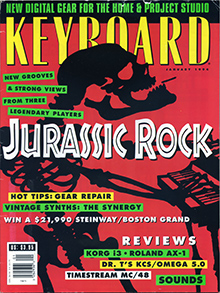 Here we could discuss the whole realm of "lead synthesizer", which had Jan Hammer as one of its most influential early practitioners (one could notice that - though he was a prodigious soloist, and an originator of the "synth solo" thanks to his Modular Moog solo played as a coda to Lucky Man, the closing track off the first album by Emerson, Lake & Palmer - Emerson was not really part of the "lead synth" category where the pitch-bend wheel acts as an emulation of lead guitar "bending", and "strap-on" keyboards are used at "impossible" angles). We could argue at length - even quite heatedly - about a concept such as "I like him 'cause he's good", as in "proficiency". Maybe "proficient" is not really adequate as a basis for discussion, but at least it's something "measurable". "He's good 'cause I like him" - the current formulation - doesn't appear like much of an improvement, besides making all chances of a dialogue quite slim. While already sizable at the time of The Nice (a group that was highly regarded but not really "heavy" when it comes to sales), Emerson's influence as a keyboard player became immense with Emerson, Lake & Palmer, one of the most famous groups of the 70s (on a par with, say, Led Zeppelin). But, alas!, sooner or later everything ends, and so the 80s were not "Emerson's decade". One has to be honest, though, and not choose only those facts that can help one's thesis. One could mention Greg Hawkes's "minimal" keyboard approach with The Cars, and so call "Kraftwerk's approach" as "the winner". But one could mention Steve Porcaro's keyboard work with Toto - which also featured the Polyfusion modular synthesizer - instead, as being related to Emerson's multi-timbral orchestral dimension that technology's progress now made more practical. 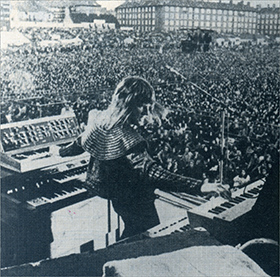 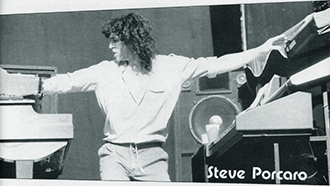
But let's not forget Dave Stewart, who - starting with the progressive trio called Egg (a line-up that wore the Nice influence on their sleeve), and later with groups such as Hatfield & The North, National Health, Bruford, and Stewart & Gaskin - for a couple decades was a leading figure in the field that, for reasons of convenience, is called "Canterbury rock". While in his "organ solo mode" - it's a Hammond L100 - Stewart often sounded not too far from Soft Machine's Mike Ratledge (just listen to his solo as a guest musician on Steve Hillage's solo album Fish Rising), the money earned with Bruford and those early hit singles with Stewart & Gasking made it possible for him to feature polyphonic synthesizers with "synthetic orchestral colours" which clearly showed their lineage (already the MiniMoog solo on Share It, off Hatfield & The North's The Rotters' Club, featured an Emerson-flavoured instrumental exuberance). Then Punk changed everything. At least, that's what one often hears. Here one has to ask oneself the question: How much of that change - readers already know the story about groups splitting, drying up, simplifying their approach, changing their goals, re-designing their beards, etc. - can be regarded as having a heterogeneous nature? Forty years later, the "survival of the dinosaurs" is a fact. Readers can look around, adding names such as Elton John and The Rolling Stones to what's already mentioned above. (And a lot more: as readers well know, once a month Billy Joel - somebody whose name many people associate with the idea of milk well past its sell-by date - boards an helicopter standing on the roof of his home in order to travel a few miles, landing on the roof of The Madison Square Garden, where he proceeds to perform for a compensation of $1.000.000, then going back home just in time to have dinner). These facts are not compatible with the idea of "a gigantic change" as talked about in the past. The year 1977 saw Emerson, Lake & Palmer suffer enormous losses - a fact that could explain those two bizarre albums released by the group after Works, Vol. I - despite the fact of the tour being sold out, due to colossal expenses completely out of control (maybe the trio could have employed Mick Jagger as their consultant). "Times" were definitely not so "punky". Just as a for instance, let's not forget that 1975 is the year when Keith Jarrett's solo piano double album titled The Köln Concert was released - an album that is both the Jazz solo album and the Solo piano album with the greatest sales ever. What did, indeed, change was the press attitude when it comes to "complex music" - let's not forget the "commercial war" being fought by U.K. music weeklies such as The Melody Maker and The New Musical Express, which practically eliminated any praise for groups such as National Health and 801, killing them at an early stage. The winners? Disco, and Abba, until the "8bit redesigned landscape" propelled Trevor Horn's groups to the top of the charts. (The fact that at the time some thought that getting rid of the music the took its inspiration from such composers as Leoš Janáček and Modest Mussorgsky could help pave the way for groups influenced by such composers as Paul Hindemith and Olivier Messiaen only shows how wrong one can be.) Progressing from theatres to stadiums was never easy for anybody, and I think that can be said that only Pink Floyd and David Bowie safely made the transition (excluding the pig). From those cannons shooting for real to those giant papier mâché monsters, Emerson, Lake & Palmer's live dimension was (and still is) quite ridiculous (and what about that levitating, rotating piano?). There was also a weakness right from the start, with the rhythm section sounding quite recognizable and personal but stiff, a martial air appearing even when not necessary. Emerson had a solid Jazz background - piano: Brubeck, Monk, Evans; organ: Jack McDuff, Jimmy Smith, Brian Auger (does anybody remember Brian Auger?) - that made his phrasing sound elastic. Sure, there's the problem of compensation linked to a name (any two members out of three: $5.000, all three members: $25.000, or at leas that's what I was told about Crosby, Stills & Nash). There are those who argue that - as it's the case when it comes to Led Zeppelin - while the early albums are more famous, the later ones released by the group are more solid. But the first album of same name - an album that at the time one didn't have to own in order to know to perfection - shows Emerson, Lake & Palmer caught at a time when nothing is certain, when there's still a lot to prove. Keith Noel Emerson: musician. November 2nd 1944 – March 10th 2016 © Beppe Colli 2016 CloudsandClocks.net | Apr. 19, 2016 |
||
 |